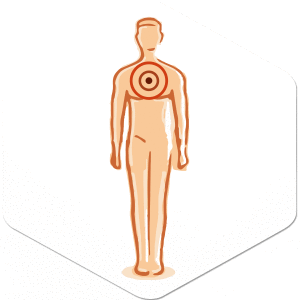Chest Pain
The first thing you may think of when you are experiencing chest pain is heart attack. Certainly chest pain is not something to ignore. You should know that it has many possible causes. In fact, as much as a quarter of the U.S. population experiences chest pain that is not related to the heart. At Interventional Pain Associates we take chest pain very serious. We suggest you seek a pain specialist about this pain. We specialize in finding the root of the chest pain to treat it accordingly.
Chest Pain Definition
- Chest pain is discomfort or pain that you feel anywhere along the front of your body between your neck and upper abdomen.
What Causes Chest Pain?
Chest pain may also be caused by problems in your lungs,esophagus, muscles, ribs, or nerves, for example. Some of these conditions are serious and life threatening.
- Heart or blood vessel problems that can cause chest pain:
- Angina or a heart attack. The most common symptom is chest pain that may feel like tightness, heavy pressure, squeezing, or crushing pain. The pain may spread to the arm, shoulder, jaw, or back.
- A tear in the wall of the aorta, the large blood vessel that takes blood from the heart to the rest of the body (aortic dissection) causes sudden, severe pain in the chest and upper back.
- Swelling (inflammation) in the sac that surrounds the heart (pericarditis) causes pain in the center part of the chest.
Lung problems that can cause chest pain:
- A blood clot in the lung (pulmonary embolism)
- Collapse of the lung (pneumothorax)
- Pneumonia causes a sharp chest pain that often gets worse when you take a deep breath or cough.
- Swelling of the lining around the lung (pleurisy) can cause chest pain that usually feels sharp, and often gets worse when you take a deep breath or cough.
Other causes of chest pain:
- Panic attack, which often occurs with fast breathing
- Inflammation where the ribs join the breast bone or sternum (costochondritis)
- Shingles, which causes sharp, tingling pain on one side that stretches from the chest to the back, and may cause a rash
- Strain of the muscles and tendons between the ribs
Chest pain can also be due to the following digestive system problems:
- Spasms or narrowing of the esophagus (the tube that carries food from the mouth to the stomach)
- Gallstones cause pain that gets worse after a meal (most often a fatty meal)
- Heartburn or gastroesophageal reflux (GERD)
- Stomach ulcer or gastritis (burning pain occurs if your stomach is empty and feels better when you eat food)
In children, most chest pain is not caused by the heart.

